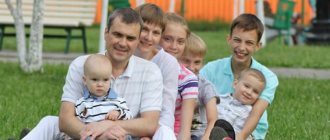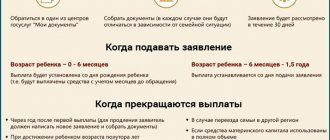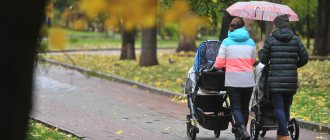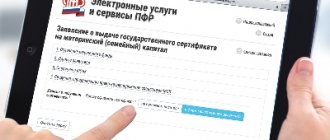Home / Benefits / What, in addition to the survivor’s pension, is entitled to a child in the Moscow region
For citizens who receive social assistance, regional social cards are provided. The card is issued at the social security office at the place of residence or at the MFC. This type of card contains information about what social assistance the recipient is entitled to and combines the function of a means of payment. For example, discounted travel on electric trains for a survivor's pension, which is recorded in the card chip. Using the card, you can pay for housing and communal services, top up your account, and make transfers.
- Insurance. This type of payment consists of two parts: fixed (in the amount of 50%) and insurance. The insurance part of the pension depends on the length of service and the salary of the deceased. In 2021, the fixed part of the pension is 5334.2 rubles; accordingly, 2667 rubles will be accrued. Orphans receive 100% of the fixed payment (FB);
- Labor. For orphans and children raised by a deceased single mother, the benefit is 2562 rubles in 2021, for other dependents - 1281 rubles;
- State. Entitled to disabled relatives of deceased cosmonauts and persons injured due to man-made and radiation disasters;
- Military. Recipients are disabled relatives of deceased military personnel and employees of the Ministry of Internal Affairs. Relatives of deceased conscripts will receive a minimum payment of 10,068 rubles; those who died as a result of a military injury will receive 7,551 rubles. For dependents of military contractors and employees of the Ministry of Internal Affairs, payment is calculated based on the amount of monetary allowance (50% and 40%) depending on the cause of death of the breadwinner.
It should be remembered that the social card in many regions has not yet become a single document for confirming rights to benefits. Often, paper confirmation is required along with it, and the only benefit that can be easily obtained is discounted travel on public transport.
State and social assistance to children left without the protection of one of the breadwinners is assigned in accordance with Federal Law No. 178, adopted in 1999. Benefits after the loss of a breadwinner can be applied for by every disabled family member who was dependent on the deceased. The exceptions are persons who contributed to the death of the breadwinner.
We recommend reading: Amount of benefits for nursing mothers Voronezh
Recipients of benefits
Disabled relatives of the deceased, in addition to the survivor's pension (PPC), have the right to count on social benefits.
Help is expressed not only in monetary terms in the form of subsidies, social benefits and other payments, but also in kind (Article 12 of the Federal Law No. 178). The main principle of providing benefits is the targeting of the recipient, that is, assistance is sent to specific categories of citizens. For example, benefits have been established for children receiving a survivor's pension, measures are being taken to provide social support for the elderly, etc. An indicator of the need for additional social assistance is the subsistence minimum (ML) in certain regions of the country. If a citizen’s PM is lower than established, then assistance is prescribed.
Recipients of benefits under the PPC:
- children of the deceased breadwinner, including adopted children, younger sisters, brothers and grandchildren, until they reach adulthood. It is important to take into account the main condition - the absence of able-bodied parents. If the parents are pensioners or disabled, benefits will be paid;
- the same category of persons while undergoing full-time studies until the age of 23. Since 2018, full-time study is allowed not only in the Russian Federation, but also in a foreign country (read more in the article “Survivor’s pension after 18 years”);
- the same category of children who have reached adulthood but are disabled, but the disability was acquired before the age of 18;
- disabled relatives supported by the deceased - spouse, parents, disabled grandparents, but on the condition that there is no one else to care for them;
- a disabled spouse and parents who were not previously supported by the deceased, but due to circumstances have lost their main source of income;
- a relative of the deceased, whose ability to work and age do not matter, who has taken upon himself the upbringing of the children of the deceased, including younger relatives, until the youngest child turns 14 years old;
- children left without both parents;
- children raised by a deceased single mother.
General design rules
The pension is issued through the Pension Fund by personal submission, or through the employer, or by mail, or through the MFC (if there is an agreement between the territorial departments of the MFC and the Pension Fund), through the Unified Portal of Public Services or through a personal account on the Pension Fund website (clause 4 of the Rules, approved By Order of the Ministry of Labor of Russia No. 884n dated 17.,2014, Administrative Regulation No. 16p).
To do this, you will need to provide the entire set of required certificates. According to the general rules, until the dependent has reached the age of 18 or 23, if he continues to study, he receives a pension, as well as a social supplement in the absence of adulthood or legal capacity. Social benefits are paid from federal and regional funds.
Important! Receiving a pension is possible only in the absence of ability to work or work.
Additionally, there are a number of rules that apply to the issuance of social guarantees:
- an adopted person has equal rights with a half-blooded person;
- a stepson or stepdaughter, when maintained by a stepmother or stepfather, has equal rights with their own son or daughter;
- The amount of pension provision will not depend on the length of insurance or the cause of death. But the exception is suicide or death when committing an intentional criminal act;
- Dependency of a minor whose parent is deceased or killed will not require proof. Among the exceptions are the presence of majority and legal capacity acquired before the age of 18.
Important!
To assign a pension, the person providing for dependents may not only be deceased, but also missing, as determined by the court. The calculation option and the amount of pension provision will depend on the category to which the person providing for others belonged. If you have insurance coverage, the labor option is paid, and in other cases, the social option. The remaining cases include suicide and death while committing crimes. But as a general rule, the amount of the insurance pension is calculated for each disabled family member of the deceased by multiplying the individual pension coefficient of the deceased by the cost of one pension coefficient as of the day when the pension began to be assigned (Article 15 of Law No. 400-FZ).
How to apply
Registration can begin after the death of the breadwinner, since pension provision is established upon a positive decision from the date of his death.
The appeal is made either by the person who was supported, or by his legal representative, in the form of a guardian or second parent. You will first need to collect a full package of documents, which must include information about the person’s death, as well as personal information about the dependent, but whose pension is being issued. An application is submitted along with the documents.
Next you need to wait for a decision. If it is positive, pension and benefit coverage begins, and if it is negative, the reason for the refusal is announced.
What documents need to be provided
Guarantees will need to be issued at a regional or municipal institution. Pension security will need to be obtained from the Pension Fund, and additional social guarantees from the social security authority. To do this, you must personally provide a package of documents. The exception is for children whose interests are represented by a second parent or guardian. Another option would be a power of attorney, but this person must have a notarized power of attorney. List of documents:
- death certificate of the person who provided financial support;
- a pension-type certificate (it should be borne in mind that as of April 1, 2019, an insurance certificate is no longer issued; instead, a document has been introduced that confirms registration in the personalized accounting system - Part 2 of Article 16 of Law No. 27-FZ dated 04/01/1996, clause 6 of article 1, article 7, 9 of Law No. 48-FZ of 04/01/2019);
- documents on family composition and the birth of children, including adoption;
- work book of the breadwinner, or other documents confirming family relationships;
- a savings book or bank account used in the future for transfers of pension payments.
Additional certificates may also be required, for example, a certificate of insurance experience, a certificate from a place of work, a dependent’s student card, a certificate from ITU recognizing disability, or a pension certificate.
If the status is missing, you will need to attach a court decision on this fact.
Important! To calculate a labor (insurance) pension rather than a social pension, the work book must indicate at least one day worked.
Where to go
The funds are transferred to a special account that was opened by the second parent, guardian or child, provided that he is already 14 years old. Any type of pension will be issued through the territorial body of the Pension Fund, and preferential conditions or additional assistance through the social security authority.
In some cases, obtaining all guarantees from the state can be done through the social service, but a personal visit to the pension department will still be required.
Types of social benefits for loss of a breadwinner
The main benefit for disabled close relatives of a deceased breadwinner is a survivor's pension. Depending on the length of service of the deceased and the type of activity, the following type of payment is assigned:
- Insurance. This type of payment consists of two parts: fixed (in the amount of 50%) and insurance. The insurance part of the pension depends on the length of service and the salary of the deceased. In 2021, the fixed part of the pension is 5334.2 rubles; accordingly, 2667 rubles will be accrued. Orphans receive 100% of the fixed payment (FB);
- Labor. For orphans and children raised by a deceased single mother, the benefit is 2562 rubles in 2021, for other dependents - 1281 rubles;
- State. Entitled to disabled relatives of deceased cosmonauts and persons injured due to man-made and radiation disasters;
- Military. Recipients are disabled relatives of deceased military personnel and employees of the Ministry of Internal Affairs. Relatives of deceased conscripts will receive a minimum payment of 10,068 rubles; those who died as a result of a military injury will receive 7,551 rubles. For dependents of military contractors and employees of the Ministry of Internal Affairs, payment is calculated based on the amount of monetary allowance (50% and 40%) depending on the cause of death of the breadwinner.
Is a survivor's pension beneficial in every case? The answer depends on the size of the PV. The size of the pension fund for old age and loss of a breadwinner differs - 5334 and 2667 rubles. Therefore, it is sometimes unprofitable for a disabled relative to switch from an old-age pension to a PPC.
If during his lifetime the breadwinner did not officially work or did not reach the established minimum insurance period, social PIC will be paid. The social pension is accrued in a fixed amount and in 2019 amounts to 5034.25 rubles for each disabled dependent. If the pension amount is lower than the established monthly minimum (in 2021 it is equal to 8846 rubles), then a social supplement is due. For children, additional payment is made automatically until the age of majority, from the moment the right to PPC becomes available.
The increased size of the social PIC is based on:
- orphans;
- children raised by a single mother;
- disabled relatives of conscripts.
How to take advantage of the benefits provided for children who have lost their breadwinner
A needy citizen who intends to apply for financial support from the state must take care in advance of preparing the required package of papers. Otherwise, you will not be able to receive payments.
Procedure for drawing up an appeal
When applying for state assistance, a guardian or relative of a minor (who is responsible for him) must first submit a request to the branch of the local Pension Fund of the Russian Federation.
An application for preferential subsidies will be drawn up directly on site. The application must reflect the following:
- personal and address details of the applicant;
- address and name of the Pension Fund division;
- type of registration request;
- information about the deceased: date of death, its cause, passport information;
- list of family members of the deceased;
- statement of receipt or absence of other benefits;
- list of attached additions;
- bank card details for depositing funds;
- day of compilation and personal signature.
Adults will have to apply in person; citizens under the age of majority will be represented by a second parent/relative/guardian.
Papers that must be provided
Before submitting your application, you need to collect a number of documents, without which the application simply will not be accepted:
- passport (original and photocopy), birth certificate;
- documentary evidence of the death of the deceased;
- work record book, military officer - everything that can confirm the length of service of the deceased;
- his total income for the last 5 years;
- ID card of a disabled person, if any.
When applying for benefits for a child who has lost one of his parents, it is necessary to remember that the package may differ depending on the region. Before submitting an application, you should find out all the details from government agency employees.
Even a strong person finds it difficult to cope with the death of a loved one. Of course, citizens who cannot take care of themselves have it even more difficult.
Leaving this category of people without any support after the death of their breadwinner is wrong, so the legislation provides for several preferential systems aimed at ensuring that such people can cope with their loss.
Fringe benefits
Additional benefits apply to certain categories of recipients. Survivor's pension and benefits are available to children who have lost one or both parents.
What benefits do children have for losing a breadwinner?
- free pass. A survivor's pension gives the right to travel on public transport at the expense of the state;
- Prescription medications are provided free of charge to children under three years of age;
- provision of free food in a dairy kitchen for up to two years with a doctor’s prescription;
- free entry to municipal zoos, museums, exhibitions and other cultural and entertainment events up to the age of seven;
- from 7 to 18 years of age, and for students under 23 years of age the right to attend cultural and entertainment events is granted at discounted rates;
- Schoolchildren are provided with free textbooks and meals twice a day at the educational institution.
For citizens who receive social assistance, regional social cards are provided. The card is issued at the social security office at the place of residence or at the MFC. This type of card contains information about what social assistance the recipient is entitled to and combines the function of a means of payment. For example, discounted travel on electric trains for a survivor's pension, which is recorded in the card chip. Using the card, you can pay for housing and communal services, top up your account, and make transfers.
Benefits for orphans
Orphans are a separate category of little Russians, whose care the state has taken upon itself. Federal Law No. 159 establishes benefits for orphans. In addition to the survivor's pension, these include:
- the housing left behind by the parents, or part of it, goes to the child. If the parents of an orphan child did not have their own housing or it is impossible to stay in the existing one, the state, upon the child reaching the age of majority, provides housing out of turn on the right of ownership or a social tenancy agreement (Article 8 of the Federal Law No. 159);
- free education in higher and secondary educational institutions;
- priority right when enrolling in studies, but only after passing exams;
- the right to receive a state social scholarship up to 23 years of age on an equal basis with the state academic scholarship of an educational institution. But if there are arrears on exams, the payment of the scholarship is suspended. The scholarship continues to be paid during internship, academic leave, and maternity leave. Cannot be lower than the minimum scholarship for other students;
- for completing industrial practice, a salary of 100% is accrued;
- allowance for the purchase of clothing, shoes, and other necessary items;
- For the purchase of textbooks and office supplies for students of educational institutions, an allowance in the amount of a three-month social scholarship is provided.
- Paid within a month after the start of the academic year;
- benefits for free food, medical treatment;
- free recreation in children's camps and other recreational institutions, including transportation costs for a two-way trip;
- the right to social protection from unemployment through assistance in finding a job, obtaining a specialty and professional knowledge;
- free legal assistance and protection of the rights of orphans in court.
In the period 2018–2019, the amount of social benefits for orphans was increased by 4%.
How to arrange everything
Registration of benefits after the loss of a breadwinner is possible at the Pension Fund of the Russian Federation at the place of residence of the deceased. According to the law, family members who have lost their breadwinner must apply for benefits in person. The interests of a minor child or an incompetent citizen (must be recognized by the court) can be represented by other relatives.
To qualify for such social support measures, interested persons must submit the following documents:
- Applications from all family members;
- Death certificate;
- SNILS;
- Documents that confirm the existence of family relationships (children’s birth certificate, certificate from the civil registry office on marriage registration);
- Documents confirming the adoption of the child;
- Work record book of the deceased;
- Details of bank accounts where funds will be transferred.
After reviewing all the submitted documents, the state fund employee decides on the need to pay a pension, as well as provide applicants with a number of other benefits that are due in this case.
All funds paid in the event of the loss of a breadwinner are accrued starting from the next month after the applicant submits all the necessary documents.
Benefits for disabled relatives
Widows and close relatives of a deceased person or a serviceman who died from wounds within a year are entitled to a one-time compensation in the amount of 3 million rubles, which is divided equally among everyone (Article 8 of the Federal Law No. 306).
Also, relatives of deceased military personnel are entitled to additional benefits:
- funds are allocated for housing repairs every 10 years;
- benefits for housing and communal services, fuel costs for heating housing;
- sanatorium-resort treatment, social medical services;
- other compensation.











